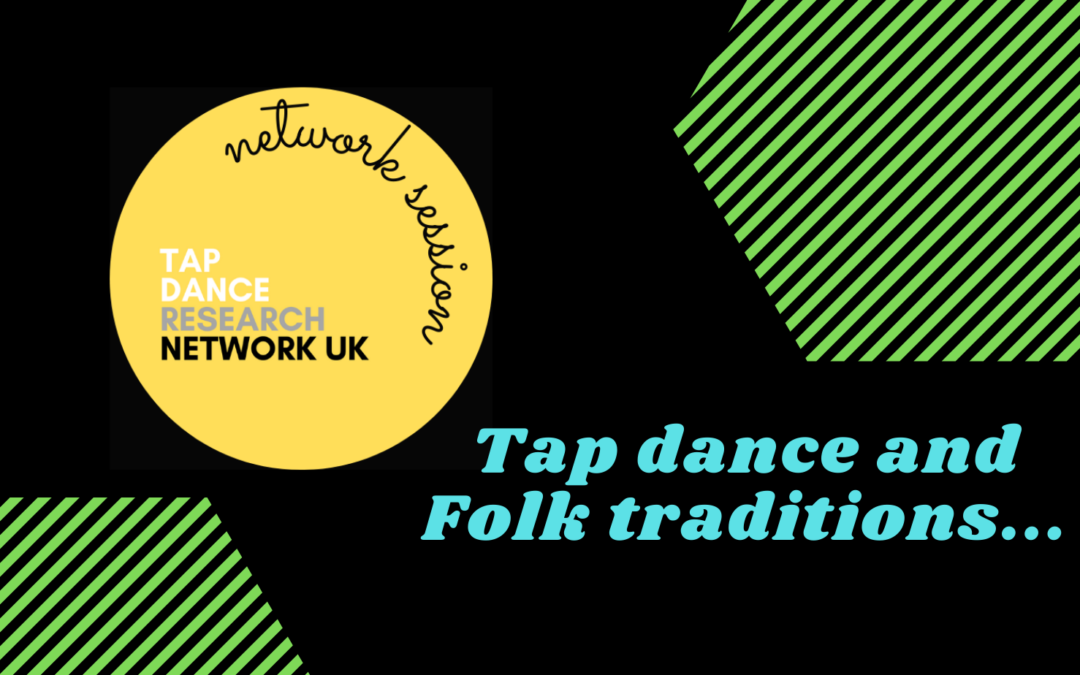In this session we discussed academic approaches of studying folk traditions and folk dance, how folk traditions are approached in dance scholarship, and where tap dance fits into these topics. We started off the session with these questions to consider:
- What are opportunities, challenges, impacts of thinking about tap dance from the perspective of folk tradition?
- What makes something a Folk tradition and who decides that? Who’s tradition is it and what does that mean for how you personally engage with it?
- How does considering tap dance as a folk tradition affect the way we tap dance, educate, create, function commercially?
- What are we building our understandings of ‘folk tradition’ on and what does this need to evolve?
- What is your experience of exploring Tap Dance and Folk traditions?
Sally Crawford-Shepherd shared her experience exploring the topics during her fieldwork for her PhD, specifically during an Erasmus Exchange at Norwegian University of Science & Technology (NTNU) in 2008. She introduced the disciplines and methodologies of Dance Anthropology, Ethnography, Autoethnography, Ethnology, and Ethnochoreology. She also discussed how there are different approaches and schools of thought between American/British and European approaches to these areas of study in dance scholarship:
- American/British may focus on anthropology of human movement, meanings of movement to understand something about that society or people dancing; focus on movement systems, intentions behind the movement.
- European may focus on the folklorist approach (focus on folk traditions) or ethnology and examine how dances develop and change over time to due to cultural context.
The discussion then shifted onto how the terms ‘folk’ and ‘ethnic’ are complicated and depending on the approach taken in dance scholarship. The term ‘folk’ is often taken from the folklorist perspective and the roots of studying folk dance rely on 19th century interpretations and associations with peasant class or rural communities. The term ‘ethnic’ can constitute dance performed by a group of people living in a group/region, defined as sharing culture, or as a dance characteristic of a particular cultural group. She discussed how looking at tap dance as a folk tradition or part of folk tradition for her particular area of research into English tap jams was difficult to fully define using this European context. She also shared her experience working in Trinidad and Tobago and how exposure to folk dance and traditions there continued to raise questions about what can be defined as ‘folk’.
The discussion among the group included resources to look at for investigating approaches to folk dance and folk tradition. The conversations in the group also covered pros and cons for looking at tap dance under the lens of folk traditions and what that could mean for how we view music, rhythm, pedagogy, preserving, and innovating the art form.
Summary of discussion points – pros and cons of thinking about tap as a folk tradition and questions:
- Thinking of tap as a folk tradition allows us to connect to Black history through tap history.
- How does something become a folk tradition? Is it through the synergy of a cultural practice in a point in history eg: Jazz as the folk culture of tap. Dr. Barry Harris – ‘Jazz is the folk music of tap’.
- Considering the problematics of a term like ‘history’ and using the phrase ‘tap lore’ instead to suggest something that is rooted in the past but living in the present.
- An understanding of folk tradition that is based upon preservation can be limiting creatively, and a barrier to innovating.
- Is every dance and music form a folk tradition in some sense?
- Does ‘tradition’ imply a fixed ways of doing things or an established practice of innovation? Are these ways of thinking about tradition mutually exclusive or in practice intrinsically related?
- Can Hip Hop be considered a folk culture in the way that it brings together elements of music, visual art, movement, commentary. If so how does tap dance connect to this in its continual development?
- What are the motivations for defining something as a folk dance or folk tradition and it that intended to be empowering or disempowering for tap dance and tap dancers? Does describing something as a folk tradition distance it from recognition as an artistic practice or not?
- What are the motivations behind descriptions of dance and music practices as ‘ethnic’? In what ways is this term misused as a way of ‘othering’ people?

